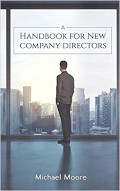|
|
|
|
|
|
|
|
|
Dear reader,
Welcome to the June 2020 edition of The Director's Dilemma. I am now so fed up of COVID-19 and post-COVID-19 memes that I am not going to mention the topic again in this newsletter.
Our June dilemma looks at the vexed issues of due diligence prior to joining a board. There is never enough diligence to cover everything; time, cost and effort must be weighed against risk in deciding where to draw the line.
I have amassed over twenty-two years' experience consulting to, and sitting on, boards. It is a pleasure to share some of it with you in this newsletter and I would be delighted to share it with you when your board needs a performance review, strategy workshop, or director education session.
Please help my research by completing the survey into the amount of time spent by executives on supporting boards. It is important and appreciated.
To read this email in a browser, go to www.mclellan.com.au/newsletter.html and click on 'read the latest issue'. I hope you are well and that you will enjoy the latest dilemma:

Willow retired last year, she loves fashion and worked her entire career in a large retail company where she was the buyer of women's leisure wear. She pioneered a project to donate unsold stock to women's refuges and immigration centres, founding an NFP company, persuading her employer to donate stock, and enlisting friends at other stores to do the same.
A search consultant has just called her with an opportunity - a board seat at a company newly acquired by a VC fund. It sounds great.
The business now has an Australian head office, as well as a pre-existing office and manufacturing facilities in China, and sales offices in New York and London. The new owners expect a profit of AUD 15 million this year and see potential for rapid growth in Australia and New Zealand where the company previously had no outlets and maintained profitability in the US and UK. They may expand into mainland Europe towards the end of their five-year plan.
Previously the operations were part of a large group and there are no published accounts that separate out the operations which will form the new company. The latest available accounts are three years old and show assets of only $30 million, revenue less than $90 million and a tiny profit. The new company is only one month old and has no track record.
Willow is keen and cautious. She had a few tense trading periods in her career when many staff were laid off and she knows from her NFP board that directors can be liable for debts if the company becomes insolvent.
How can she do due diligence on a company that is so new and that has such a shadowy past?
|
|
|
|
Albert’s Answer
 The Due Diligence process hinges on getting VITAL business information, in this case, for a yes or no decision for Willow. If something nearly sounds too good to be true, it often is. So, Willow should be very careful and do an excellent due diligence. The Due Diligence process hinges on getting VITAL business information, in this case, for a yes or no decision for Willow. If something nearly sounds too good to be true, it often is. So, Willow should be very careful and do an excellent due diligence.
She could carefully read the 5-year strategy and check it with relevant people in the industry. Since she pre-dominantly was a buyer, a finance and commercial look should help. Check with the competition if the outlook is seen also by others in the industry?
She could use the search consultant that called her to help her with the backgrounds of the Directors in place. Check the outcome with another search consultancy with knowledge of the industry (unus testis nullus testis!). By the way, she could check the VC's behaviour or lack of funds by asking if the search consultant that called her works retained or no cure no pay (the latter is cheap, but with uncertain and questionable quality).
Talk to the Chair of the non-executive board. What is his/her reputation? Does he or she, share the same values as Willow herself? Willow has her heart on the right place probably, given the NFP actions, so her values are important to her. A self-assessment of Willow regarding a non-exec role, on values might be relevant. Her values are her moral compass in the Board. And the fashion industry needs to be very transparent regarding working conditions and environmental issues (China!), especially if they want to expand into Europe.
She by now will have learned to trust her gut-feeling on values. In this case that will give her the answer to do it or not, if not satisfied, don't do it.
Albert Froom is Managing Partner at The Leaders Trust. He is based in The Randstad, Netherlands.
|
|
|
|
Julie's Answer
 Willow should sign a confidentiality deed and access the data room that contained information for bidders, as well as the planning that (hopefully) lies behind the expected future profits and growth. Willow should sign a confidentiality deed and access the data room that contained information for bidders, as well as the planning that (hopefully) lies behind the expected future profits and growth.
She should treat both the data of the previous owner and the plans of the new owner with a healthy dose of skepticism:
-
The vendor may well have failed to identify all the costs associated with running the business. It is common for the percentage of marketing, office, and HR costs to be inaccurate. These costs will now all change.
-
Running a company in Australia is very different to running a business unit in China. The plans and forecasts will be based on estimates. These may or may not be acurate or even reasonable.
Willow should get the names and contact details of the other board directors and key management personnel. If she can't research the financials she must research the Chair, senior executive team, and other board members. If she joins the board her reputation will be bound to theirs. In particular she should check that they appear reputable and that each director brings a useful skill to the board. VC boards are often small so it is important that there are no 'passengers', only 'crew'.
As there is little accurate historical data for conducting diligence Willow should focus on the people, product, and plans. She must be convinced that the product is reliable, viable and targeted to an appropriate demographic using a good mix of channels to market. She must also understand the assumptions behind the projected income and cost lines in the spreadsheets that suggest a profit is possible.
If she believes the business is viable and that she has something to add to the board she should proceed with getting to know the people and deciding if she wants to become involved.
Julie Garland McLellan is a non-executive director and board consultant based in Sydney, Australia.
|
|
|
|
Christine's Answer

This opportunity came to Willow via a search consultant. Reflecting on this opportunity, Willow should consider the following:
-
Has she dealt with this search consultant previously, is the opportunity aligned with her directorship objectives?
-
What can Willow determine about the overall establishment of the Board for this new company? Given the company is one month old, what governance measures and leadership are in place now and what is still to follow? Is there a Chair who can provide further context for the approach to her, how they are structuring the Board and director skills mix?
It can be flattering to be approached, but if this is Willow's first board role, then it is important to balance enthusiasm with caution and ensure there is a robust governance framework, especially with a brand-new organisation highly ambitious for growth.
Willow is rightly cautious about the business, being only one month old, newly acquired by VC. A few questions Willow might want to explore:
-
Noting the lack of any current financials, what financials are available. E.g.: previous management reports in relation to the current scope of business in Australia?
-
On what basis did the VC fund acquire the business? What financial assumptions and modelling were relied upon?
-
Who are the investors in the VC fund and what track record do they have in the industry and this type of business?
-
What can she find out about the management team and existing business? Does she know any of the people or suppliers to further assess capability?
If Willow can assess management reports and any financial modelling, her prior experience in the industry should allow her to interrogate the numbers, operating costs and margins, and market assumptions to determine how realistic or ambitious they may be.
I would suggest that, if these questions cannot be reasonable answered and robust numbers are not available, then any participation as a director with no prior knowledge of the organisation would be unwise. Willow's prior commercial and NRP experience is valuable and there would likely be other opportunities better aligned to her expertise and ambition.
Christine Procter is Founder & Director of Worth and While (a retail and CX consulting firm), A Beachhead Advisor for New Zealand Trade and Enterprise, and an advisory board member for Nature Baby. She is based in Melbourne, Australia.
|
|
|
|
What does your board cost and is it good value?
The cost of a board far exceeds that visible cost. Senior executives spend considerable time preparing information for the board, writing agendas, papers and minutes, tracking down information, managing “housekeeping” (conflict of interest and consent to act statements, directors shareholding notices, the logistics of board travel and meetings, etc.), and interacting with directors in committee, board, or one-on-one meetings.
The cost of that time and other intangibles is rarely tracked and few boards are aware of their total cost. In 2013 I conducted research into the cost of time spent reporting to, supporting, and administering their company's board.
Your help bringing that research up to date is greatly appreciated. Your best estimate - if you don't track time and cost for board support - is sufficient. Your comments and questions are welcome. Take the survey here.
|
|
|
|
Book Review – A Handbook for New Company Directors by Michael Moore.
 This is a small book with a massive scope. The content list establishes that the book will venture boldly into topics that are rarely covered at advanced level, and never encountered in a beginners' text. This is a small book with a massive scope. The content list establishes that the book will venture boldly into topics that are rarely covered at advanced level, and never encountered in a beginners' text.
The start is pedestrian with an introduction to corporate governance, the role of a director and the functions of a board. Then there is a piece on cultural lag followed by unity in diversity. Discipline, time management and the pareto principle are all covered before the book defines 'professionalism' as 'acting in a manner consistent with expected codes of conduct'. Conflicts of interest, networking and customer service are all addressed before the book ends, abruptly, with a useful chapter on reading financial statements.
It is never quite clear whether this is a guide to becoming a director, a guide to doing the job once you have been appointed, or a collection of startling ideas from the author's own early board experience.
It appears that the book is a compilation of blog posts; the tone and person change every three pages making it a hard book to settle down with and requiring effort to extract the intended meaning. A good structural and grammatical edit would have helped immeasurably. This is probably more of a book for established directors who want their imagination fired and horizons stretched than a book for directors encountering the concepts for the first time.
Available on amazon.com.
Julie's News - In May
May was an 'interesting' month. I invested some time in marshalling my thoughts around why some promising aspiring directors don't develop fulfilling board careers. These have been posted on LinkedIn and you can follow the thread here.
I started the month by presenting (via zoom) to a group of Tasmanian Leaders. This is always a great session and I love hearing the enthusiasm and vision that these future leaders have.
All my boards stepped up the frequency of meetings which kept me occupied. I also completed a CEO recruitment project for one board and continued mentoring clients via the internet.
As restrictions have started to ease, I have welcomed an uptick in bookings for strategy and board education workshops. I am really looking forward to getting back out and meeting people - at a safe distance - in real life.
I am always happy to help if your board has a need. Just call me on +61 411 262 470 or reply to this email for a discussion of how I might help your board.
Inspirational quote for June

A note on names - A few readers have asked me where I find the names for the protagonists in each case study; I 'borrow' them from people I meet or things that I read. Willow is a very ancient name Taken from the name of the tree which is derived from the Middle English wilwe (willow). Willow trees are noted for their flexibility and graceful appearance, hence the adjective willowy, which means "gracefully slender and lithe," qualities seen as desirable feminine attributes. For centuries the bark of the willow has been used as a medicine and it is from the willow bark that aspirin was first extracted. In Scripture, the willow is always associated with a brook or river, that is, with a perpetual source of nourishment and supply.
This newsletter - If you have any ideas for improving the newsletter please let me know. If you are reading a forwarded copy, please visit my website and sign up for your own subscription.
Suggestions for dilemmas - Thank you to all the readers who have suggested dilemmas. They are greatly appreciated. I will answer them all eventually. I could not write this newsletter without your help and without the generous help of all the experts who respond each month to the case studies.
Be a contributor - If you would like to attempt a response to the dilemmas for publication you will be most welcome. Simply reply to this email and let me know.
Let's connect - I use LinkedIn to share information about boards and directorship with my friends and acquaintances. If you use LinkedIn and we are not yet connected I will welcome a connection from you. You can find me at linkedin.com/in/juliegarlandmclellan.
Let me help you - If you would like me to speak to or train your board, staff, audience and/or group please contact me at julie@mclellan.com.au.
Farewell until the next issue due 1 July 2020. I look forward to greeting you again then. In the interim I hope you will enjoy health, happiness and hard work: Enjoy governing your companies; we are privileged to do what we do and every day is a blessing!
Best regards,
Julie

Photo Credits: Personal images in this newsletter are provided courtesy of the contributors, course attendees and conference participants.
Disclaimer:
The opinions expressed above are general in nature and are designed to help you to develop your judgement as a director. They are not a definitive legal ruling and do not constitute legal advice. Names and some circumstances in the case study have been changed to ensure anonymity. Contributors to this newsletter comment in the context of their own jurisdiction; readers should check their local laws and regulations as they may be very different.
Privacy: I am privileged to have your contact details and keep them as safely as possible. I will alert you if they are ever accessed by any unauthorised person (the technical staff at ayuda help with publishing and issuing the Director's Dilemma and have access so they can send the newsletters to you). I do not sell your details to anyone; they are kept only for the intended purpose - sending you this newsletter and helping to build the judgement of company directors by providing a safe way to consider potential responses to real life events.
Main Photo by Azil Mazumder from Pexels
|
|
|
|
|
|
|


 The Due Diligence process hinges on getting VITAL business information, in this case, for a yes or no decision for Willow. If something nearly sounds too good to be true, it often is. So, Willow should be very careful and do an excellent due diligence.
The Due Diligence process hinges on getting VITAL business information, in this case, for a yes or no decision for Willow. If something nearly sounds too good to be true, it often is. So, Willow should be very careful and do an excellent due diligence. Willow should sign a confidentiality deed and access the data room that contained information for bidders, as well as the planning that (hopefully) lies behind the expected future profits and growth.
Willow should sign a confidentiality deed and access the data room that contained information for bidders, as well as the planning that (hopefully) lies behind the expected future profits and growth.


